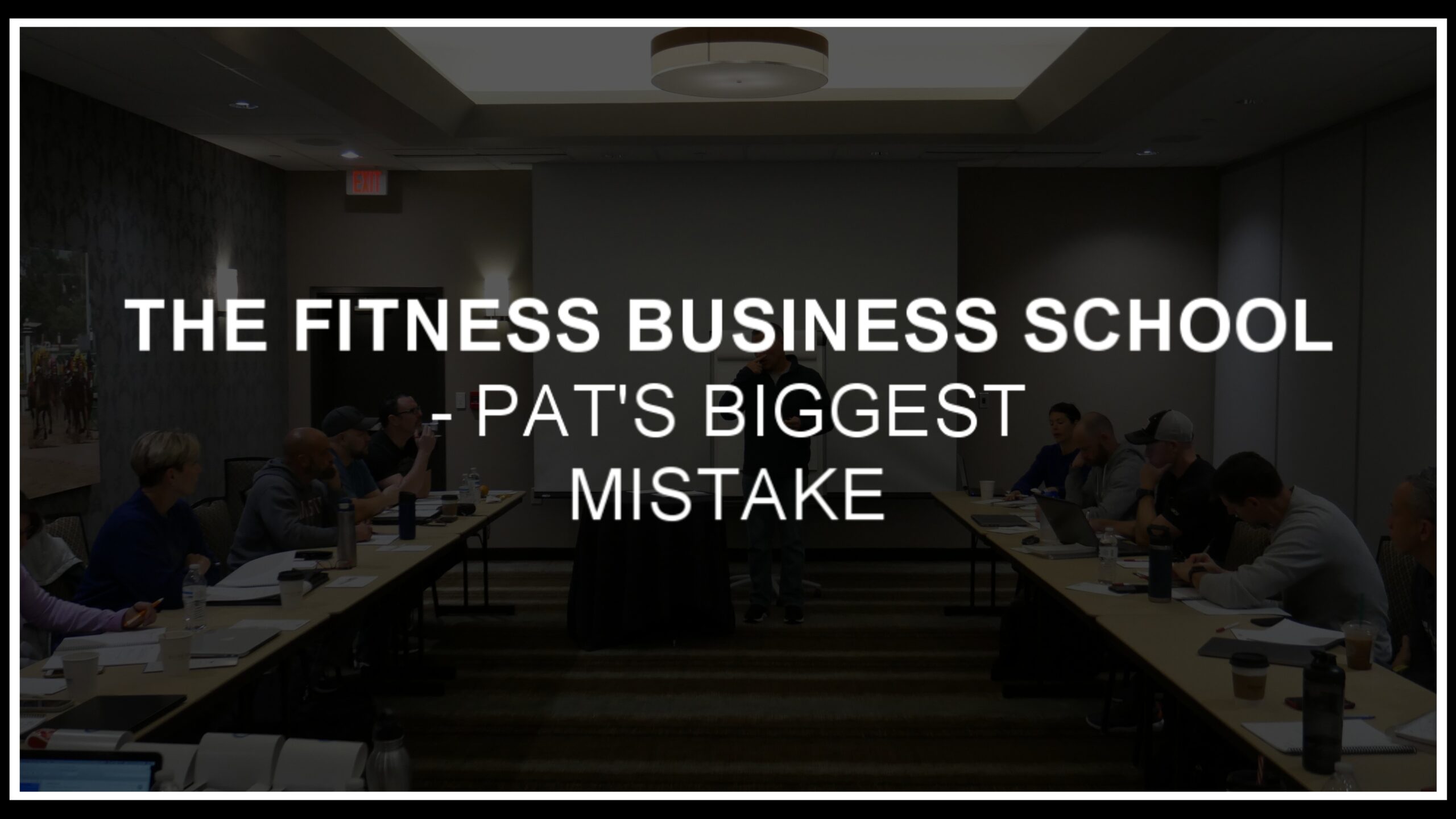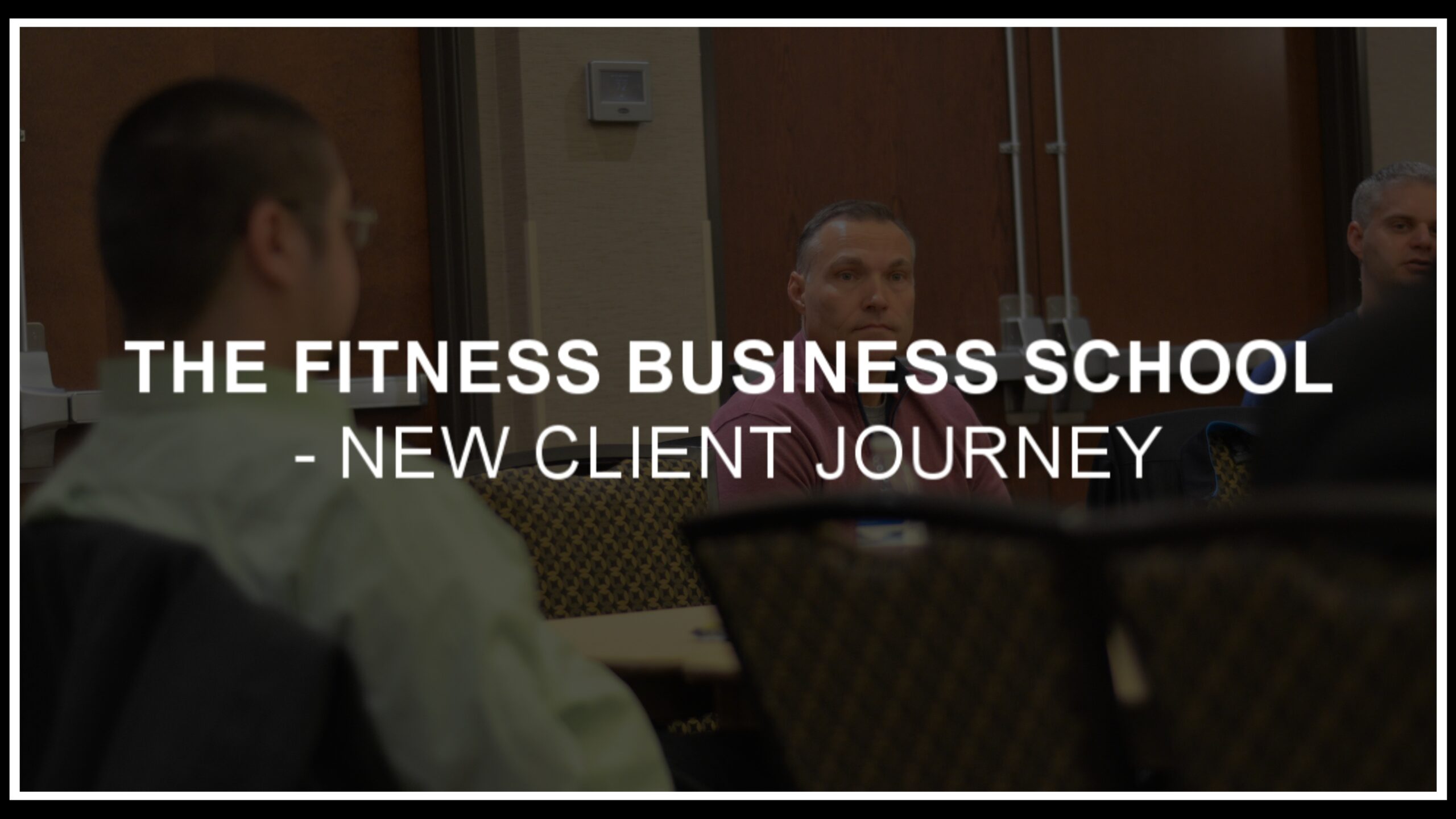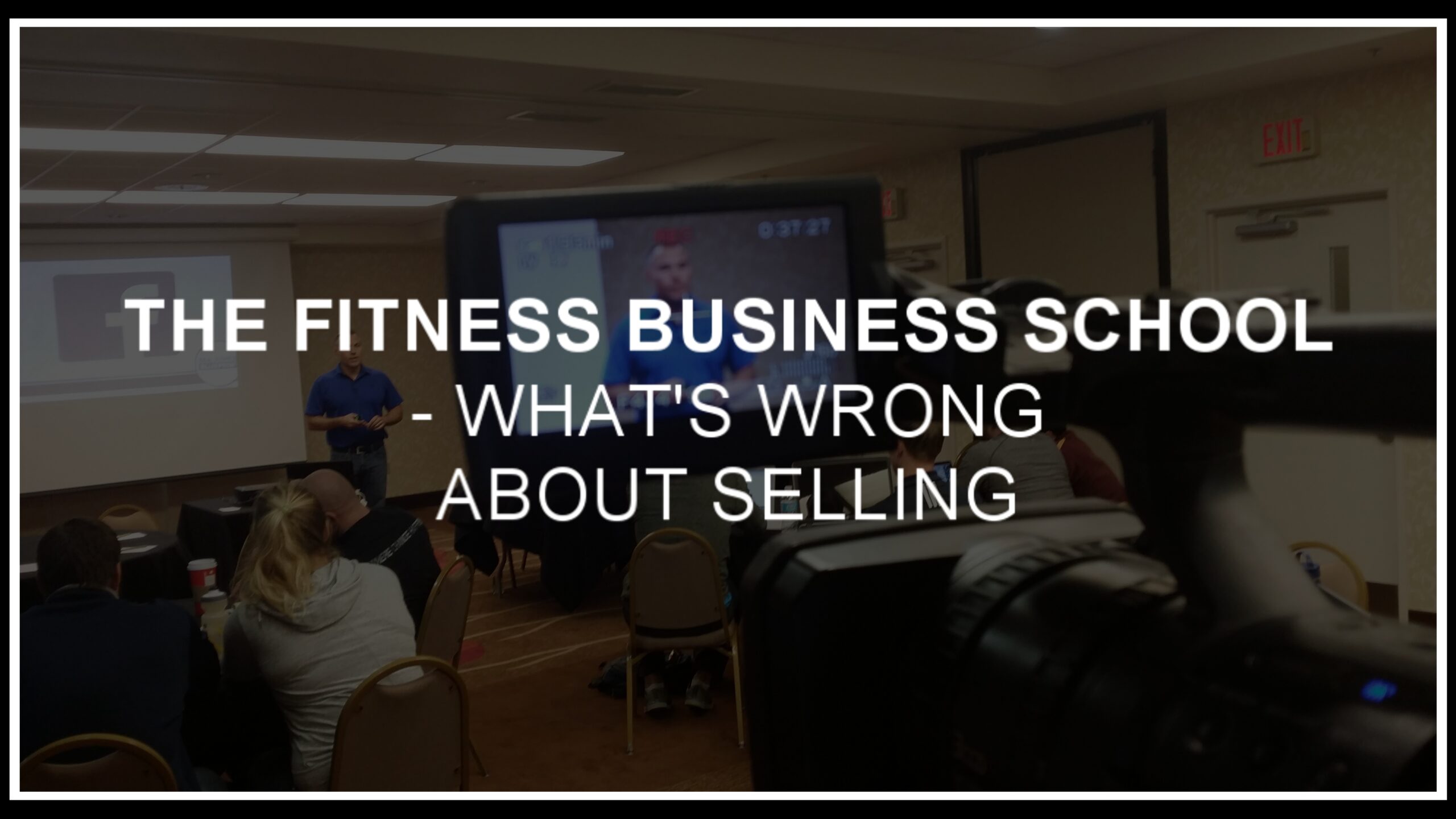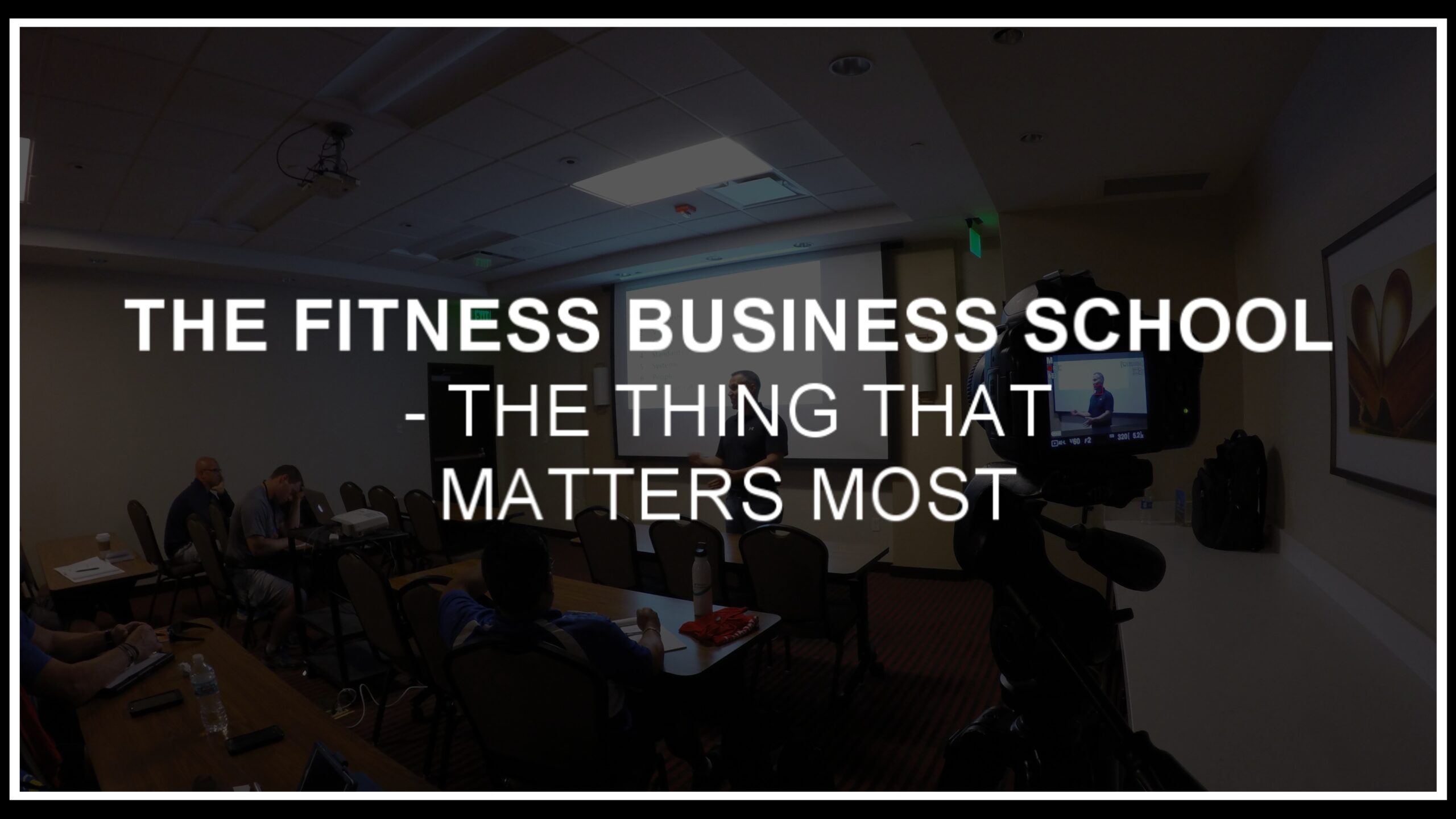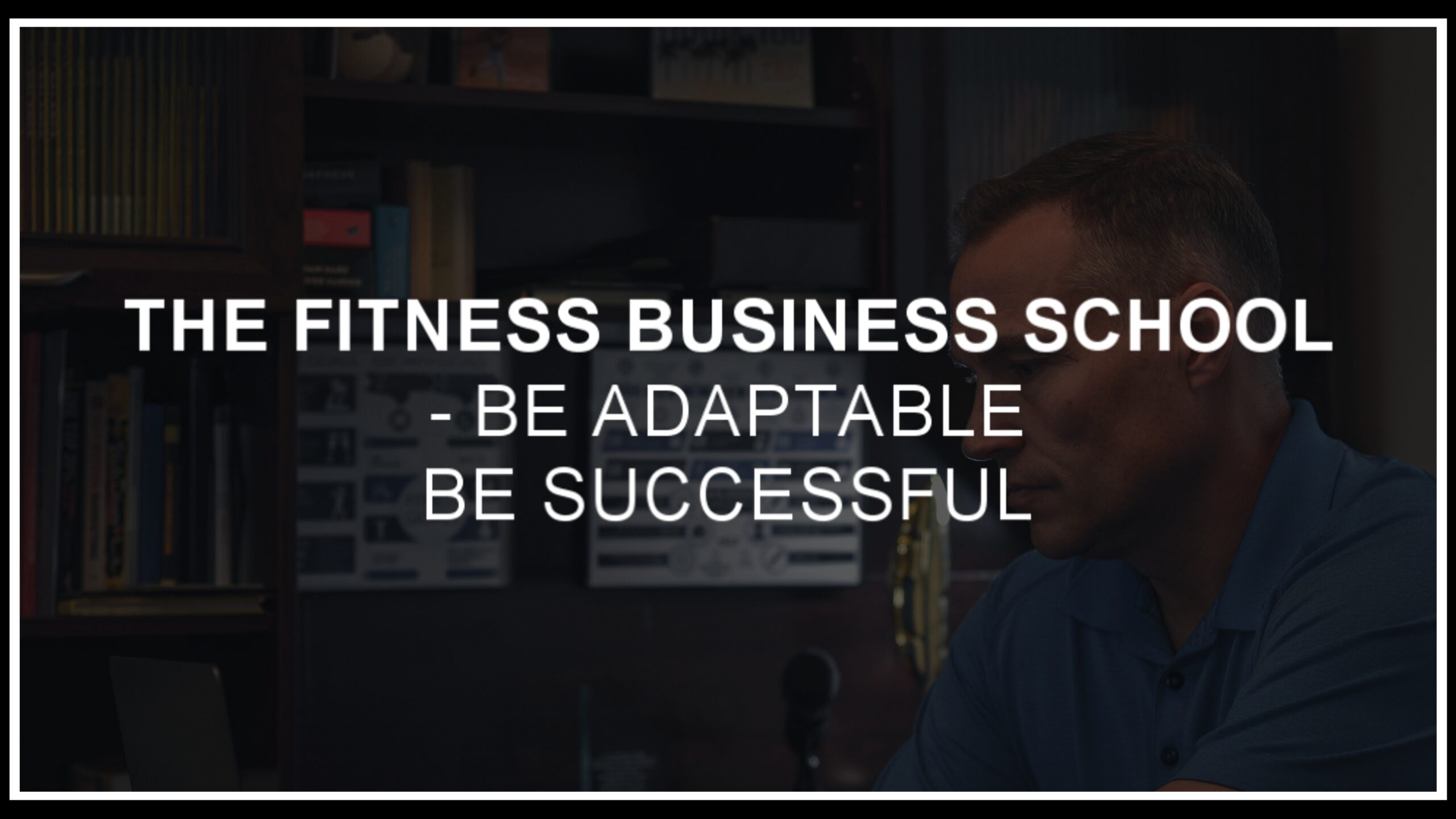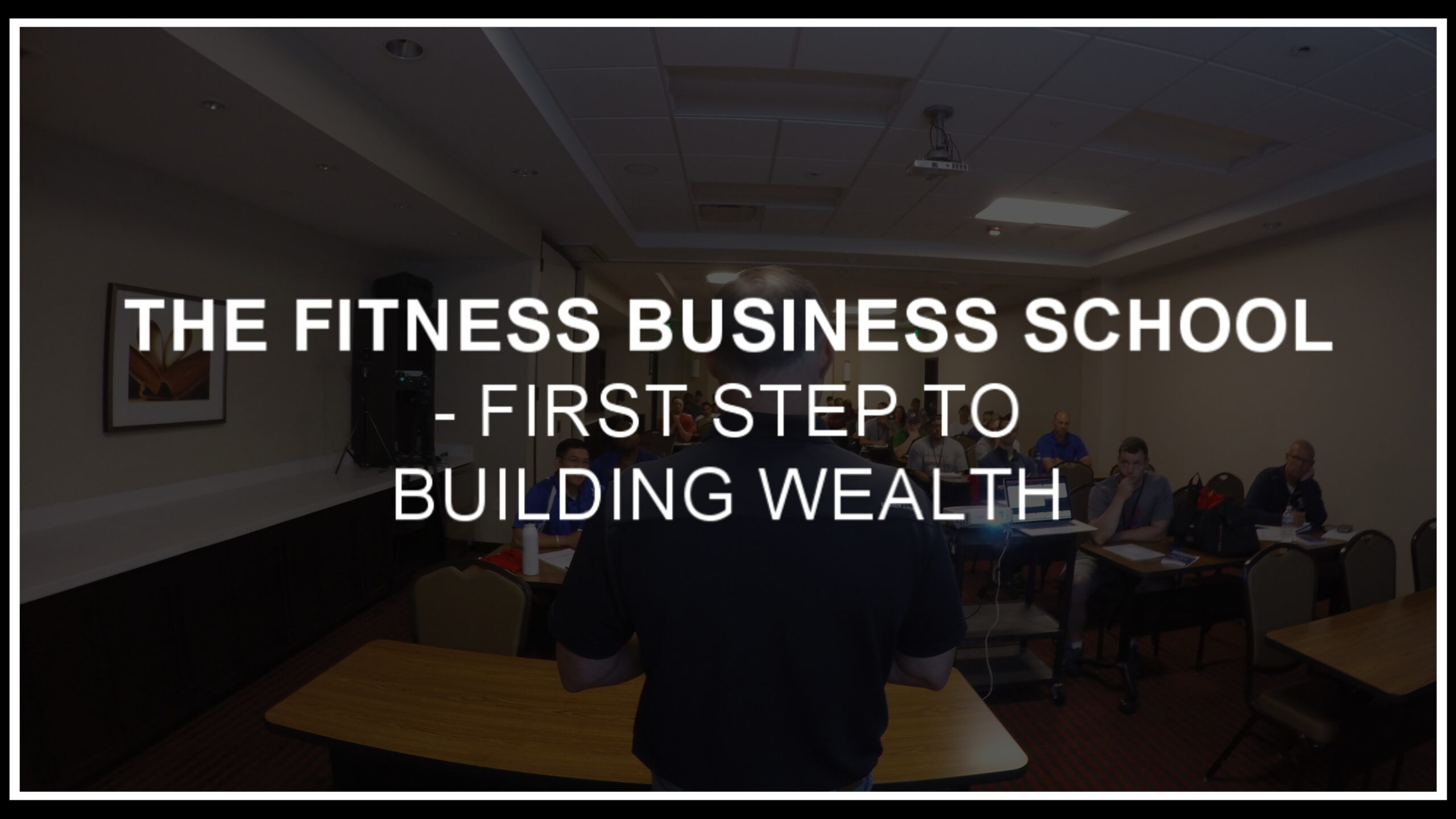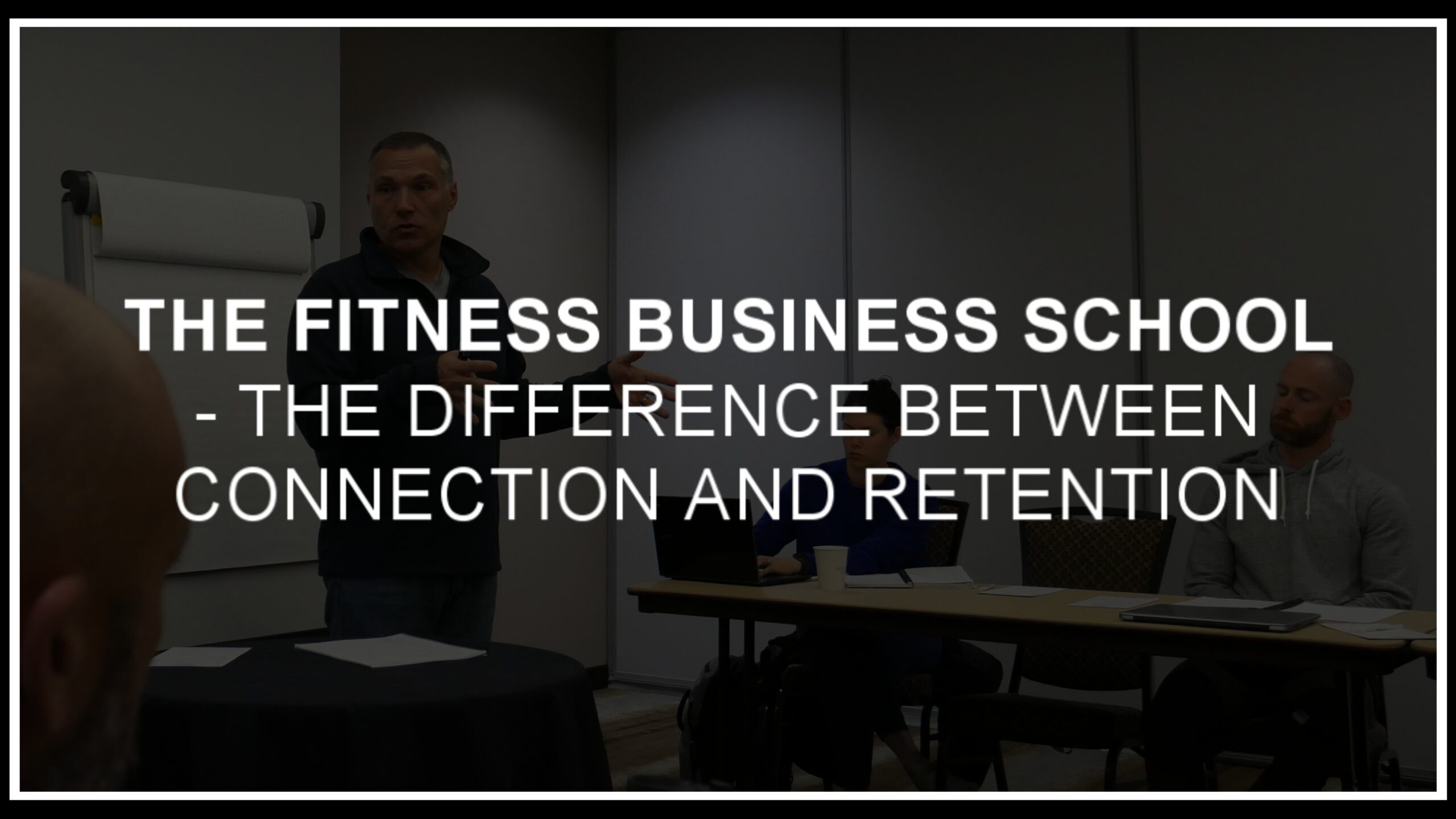Show Notes
00:00 Introduction to Today’s Episode
00:29 The Unfortunate Truth of Owning a Business
03:24 Creating Your Ideal Business
04:37 Taking Responsibility and Avoiding Victim Mentality
08:36 Establishing Guardrails in Your Business
14:12 Managing Expectations for Success
18:50 The Importance of Consistency
22:45 Conclusion and Special Offer
Full Transcript
Hey, Pat Rigsby here and in today’s episode I want to talk with you about navigating the challenges of owning a business. Let’s get to it.
Welcome to the Fitness Business School podcast, the show for fitness business owners who want to grow their income, increase their impact and improve their lifestyle. Be sure to listen to the end of this episode because we have a brand new special offer exclusive for listeners. So stay tuned.
Not too long ago, a post was circulating around the fitness business owner community that, that talked about the, what the author of the post called the unfortunate truth of owning and running a business and how business is hard and, the author who I don’t know detailed a number of the.
Maybe unknown or maybe lightly understood challenges with running a business and it got plenty of attention it to, when I’m recording this it had been shared like 7000 times. And it was, a small, like a training facility owner. And I stumbled across it because some of the people in our coaching programs had shared this post and and some of them are really successful business owners that had done, have done extraordinarily well and they shared it.
And I thought, I pretty much, Agree with all the challenges of running a business that were listed there. But I also think that as the business owner, there are ways that we can set ourselves up to, to avoid many of those things. And in hindsight, I, I 2004 and had a business partner or business partners.
In over 20 different businesses following that everything from health clubs to award winning franchises, equipment companies you name it. And probably a shade over a decade ago I hit a wall and was feeling maybe frustrated or just burned out or whatever else. With business ownership and seeing that post, it brought me back to a little bit of that and just made the decision to move on from some of the things that I had been doing previously, actually, most of the things I had been doing or been involved with previously and exited most, all of those endeavors and started fresh.
And. The idea was to create my quote unquote ideal business. And I fully understood that would require building or creating. I didn’t just get to have my ideal business. And to be fair, an ideal business isn’t something that it’s perfect. It’s not some utopian thing. It’s more of a, it’s more of a, Hey, this is a business that, that I, Enjoy owning.
I think of it almost like a family member, right? It doesn’t mean you’re not going to have disagreements with a family member. Doesn’t mean you’re not going to get frustrated from time to time, but you love that family member and you couldn’t. And you probably couldn’t imagine your life without them.
So that’s where I think an ideal business fits in. I organized some thoughts and shared some of them in a couple different settings, and I thought I would share some of that, some of those insights with you during this episode, so the first is. I think to have a business that you enjoy owning you’ve got to be decisive.
You’ve got to say, okay, I am going to take responsibility for these things. I am not a victim. And and I think that sometimes that’s where the root of the problem really lies, right? Somebody opens a business and they’re doing it almost reactively, right? Like they think. Hey, I don’t like working this place, so I’m just going to leave and do my own thing.
And some of it is just that kind of naivety or arrogance or whatever else. Thinking, Oh, I can do it better without understanding all the things that go into being a business owner. But when you’re a business owner, you’re essentially saying I’m taking responsibility for these outcomes. I am the one who is responsible, whether we win or lose, whether we’re profitable or not, and nobody’s coming to rescue me and that is.
Something that I don’t think a lot of people embrace, but perhaps, if they did embrace that, it would alleviate a lot of the problems because do get to decide, you don’t have to decide because you don’t have to own a business. You get to decide and you get to decide your pricing.
You get to decide your model or the format by which you’re going to serve people, you’re going to. Decide who your target market is. You’re going to decide your schedule and you’re going to be the one who establishes this stuff. So there are, a couple sides of this that, that I want to touch on a little bit, right?
So the first one is that avoidance of the victim mentality. There are so many people that I run across that. Want to tell me how this agency didn’t do a good job or their employee didn’t do a good job or the market was bad or something else, instead of saying, wait a minute, I’m the one who hired the agency or I’m the one who hired the employee.
Did I set them up to succeed? Was I clear on expectations? Did I just hand off responsibility without managing it? The market is what the market is. Are you meeting the market where they are and the people who are successful take as much control of their own destiny as they can. The people who are unsuccessful, frankly, I’ve yet to meet a business owner who takes a victim mentality, who has sustained success.
It doesn’t mean they can’t have any success. It means sustained success, that they thrive in different environments, they thrive as circumstances change. Because I think anybody can catch lightning in a bottle, right? Like you can catch one new marketing tactic while it’s on the way up and ride that wave for a little bit or something like that.
But if you want to have sustainable success, you can’t be a victim. You can’t sit around and blame everybody else for the business that you chose to own and you choose each and every day to continue to operate. Just shedding this whole victim mentality would probably be that, that first kind of leg of you decide.
And then the second one is you have to establish your own guardrails. And I don’t know that this is exclusive to the fitness industry, but I think that it is magnified in the fitness industry where somehow. We’ve decided along the way that somebody can pay us 149 a month for group training or 5 a day, basically.
And we’re on call for them. We’re going to reply to text messages, morning, noon, and night, holidays, weekends, all of it. We’re going to feel like the, we are, going to provide coaching, counseling, consulting, mentorship outside of training sessions, outside of things people purchase.
We’re going to work any hour that people want us to work. We’re never going to detach from our business. And man, I, I don’t know a whole lot of other businesses that operate that way. There are plenty of people who plug their phone in at night in a different room and don’t feel like they have to respond to text messages.
There are plenty of people who, there are plenty of practitioners and service providers that take Monday off or take Friday off. There are plenty of people that take guilt free vacations and don’t allow their patients, customers, clients to dictate everything about them. And. I’m almost certain that nobody that I am aware of that has a healthy, successful business over time let somebody have that kind of control over them and treat them a little bit like a pinball for 5 a day.
You can establish guardrails and just say, Hey, these are the rules by which I’m going to operate my business. And let’s face it, some of this stems from us having a cell phone. I remember growing up, my dad, as I’ve mentioned many times through podcasts and emails own owned and continues to own an auto repair business.
For years, he was, he was not somebody who was going to have a cell phone or anything like that. They didn’t they were not. This normal public things for most of my time growing up, right? Like you might see them in a movie or something, don’t remember customers calling our house all hours of the night saying, do this for me, do this for me, or do that for me.
And if somebody did, there was an answering machine or the phone would ring. You weren’t on call the way people behave now with a cell phone. And businesses can still operate that way just because something is convenient for the caller doesn’t mean it is convenient for the call recipient.
And I think that you have to understand that if you don’t take control of this, if you don’t decide other people are happy to decide for you. I remember a while back, I had just this awesome client who had a semi private business over on the East coast and, his business was doing probably.
Around 30, 000 a month and it was just him and he had hired somebody to do some, a little bit of training. And, he wanted to coach his kids, use sports teams. He wanted to take a vacation. His family would go on vacation without him. And he just was, he had just never opened his eyes to the fact that he could leave.
And so we started inch by inch and said, okay, how about you take Thursdays off and take your kid to football practice? And. Systematically, he weaned himself out of this business and got to the point where he was training about five hours a week instead of training about 35 hours a week.
And his income, personal income, hadn’t dipped a bit. It was precisely the same. And, he had to get a few more clients to offset paying other people to train those clients and still taking home as much money. But it just had never dawned on him. And I think that’s the case with guardrails in general.
I think that we’ve painted ourselves into a corner and don’t think there’s any other way, but I assure you there is a different way you can build a business that operates in the way that you want. And frankly, sometimes that’s better. I know plenty of guys that have wonderful businesses that aren’t super accessible.
And that’s part of why they have great businesses, because. There’s a little bit of
scarcity. There’s a bit of a velvet rope mentality. So being a victim and, letting go of that and establishing guardrails. Those are the first two the next one on the list. So if those are you deciding the next thing on the list is just managing expectations.
Now, I don’t want to go off on too much of a tangent here, but I believe that Expectations, whether they’re misplaced, unspoken, or unrealistic, expectations are usually the root of most problems that we have with other people. And I think that having realistic expectations, again, not some utopian thing where everything’s going to be perfect it helps people avoid that rollercoaster sense of emotion that comes with being a business owner.
If you look at things logically, and that’s not always an easy thing to do, you understand that there is going to be attrition over the course of the year. And, if you have a hundred clients and you have five percent attrition, then that means five of them are leaving this month. And if you accept that going in doesn’t mean we don’t want to improve it, but we understand that those are realistic expectations, then hopefully that can mitigate some of that sense of personal hurt if somebody leaves because it’s not really an indictment against us.
People have full lives, people’s financial resources change, their schedule changes, their priorities change. And we can just assume that if we have a big enough sample size of humans, that’s going to happen. Accepting that there are plenty of days that, that I’ll get messages from people where they’ve had a couple of days in a row that they didn’t sell something and they’re in like panic mode.
But then I’ll say how many new clients did you get last year? And they’ll say something like 60. And, I said, okay, so that means there were. At minimum 305 days, assuming that each of those people came in individually, not doubled up, not, Hey, I sold three in a day. Each of them came in individually.
There were over 300 days last year that you didn’t get a client. So there’s probably no sense in panicking when that happens. Think this is a little bit that kind of mentality of why they talk about people who ride the waves of the stock market do the best.
And the people who panic and get out at the bottom are the ones who never make as much money and that sort of thing, like you. There takes some emotional tolerance to, to own a business. But if you understand the reality of things that sometimes things aren’t going to go your way, that sometimes people leave that sometimes employees.
There is turnover in the training world, the, a few years back we discovered through, through some research that the average trainer didn’t stay in a job for longer than two years. Too often we see training business owners they build around the person thinking that’ll solve all the problems forever, not realizing that, you know what, that person isn’t going to be here as long as you are.
So you probably should build the position. Not, build around the person. And if you approach things this way, you’re going to be much, much happier. We talk about this in sports and that’s where some of this probably came a little easier to me than that, than it might to, to others is, in.
In sports and baseball specifically, nobody goes undefeated. You are accustomed to some ups and downs, it’s often said that if you get a hit three out of 10 times, you’re going to the hall of fame, right? So you don’t expect there never to be adversity. In fact, it’s an understood that the people who deal with adversity best are all the most successful.
Expecting reality. Is the next big piece of this. And then the third kind of. Leg. So we’ve got you being decisive, you managing your expectations. And then the third leg is simply being consistent. And that sounds like it’s maybe an obvious one, or maybe it’s something that you don’t see as being related to, to, to the ups and downs of being a business owner.
But the reality is business ownership isn’t really an immediate gratification thing anymore than A fat loss program is an immediate gratification thing. Nobody comes in, has one workout and loses all the weight they want to lose. And nobody deploys one marketing tactic for a day and see some magical growth that they want to see.
It’s just not how things work. And if you say, okay, I’m going to stay the course and week after week, do the things necessary to become the type of owner I want to become, to have the type of business I want to have. Over time that compounding pays off. And again, it’s a little bit like investing where things compound over time, right?
They talk about compound interest being the eighth wonder of the world. The same is true here. If you are continually. Connecting with new people, or if you are continually nurturing those relationships or growing those relationships, if you are continually making offers, and if you are continually doing your best to provide the best in market service result, quality of experience.
Over time, things will work well. Now you may shake your head when I say this and say, but they haven’t or whatever else I would say that if we were doing a deep dive on your business sitting here in my office, Some of those things you probably weren’t consistent on now, some of them, you may have been very consistent on, but very few people that I encounter have been consistent filling the pipeline.
Very few people have been consistent in making offers in generating new leads day after day. But if you’re doing that sort of thing and not waiting for the next shiny object, some magic bullet solution, that’s going to cure all your problems and fix all your ills here. It’s not. That’s not going to be a business that’s going to make you happy because it’s very much a desperation based business.
And really, a lot of this comes down to being a business that is stable and solid and not built around desperation. Because if you can do that, you’re going to be much happier. Now, again, circling back to what I talked about in the beginning, That doesn’t mean that this is perfect. It doesn’t mean that there aren’t going to be ups and downs.
It doesn’t mean, I think I have a wonderful business and I love owning and operating my business, but that doesn’t mean that 100 percent of my time is spent doing things that I absolutely love. It’s just the vast majority of my time is spent on strengths and things that I enjoy. Again, if you want to smooth out some of those rollercoaster like ups and downs, if you want to actually enjoy owning your business instead of feeling like a, somebody who’s got a low paying excessive hour kind of unpleasant job that you’re the creator of.
Then take some of these lessons to heart, because I think that that doesn’t mean business isn’t hard. It becomes very fulfilling. It becomes very worthwhile and rewarding and it’s all within your control, but it comes down to deciding. Now I’ll close up by saying. If I can be of help in, you reinventing your business as your ideal business is something you enjoy, shoot me an email at [email protected] and just share a couple sentences about where you are and where you would like to be. And we’ll hop on a call and see if I can be of help. Okay. All right. That’s how you build your ideal business.
Thanks for listening to this episode of The Fitness Business School.
Before you go, I have a quick announcement:
One of of the things that we’ve been doing with our current clients is taking them through this Ideal Business diagnostic and really what it is, this checklist that allows you to pinpoint exactly what your business needs next so you can keep improving, keep growing, and build a business that you love to own, one that pays you well, one that allows you to have the impact you wanna have and one that allows you to have a lifestyle that you truly enjoy.
In this diagnostic, we walk through everything and we do an evaluation and can instantly pinpoint what you need to do next to build that business that you want. I’m going to extend this opportunity to get on with either me or my team and take you through this evaluation and fix your business’s most vital needs fast.
So if we take you through this, you’re gonna be able to make those vital changes that you need to finally have what I call your Ideal Business. If you’d be interested in going through this entirely free, risk-free diagnostic with us and learn what you already have in place, what you’re doing well and where are your greatest opportunities for rapid improvement are just shoot me an email with diagnostic in the subject line to [email protected].
Again, an email to [email protected] with diagnostic in the subject line will get
you scheduled and take you through this evaluation to help you build the business you want.


